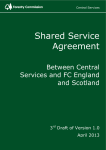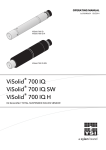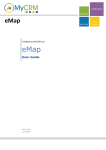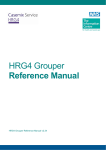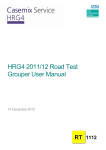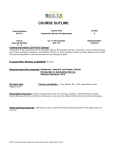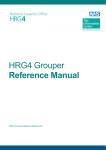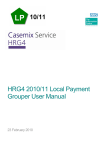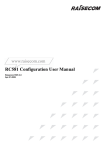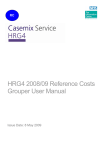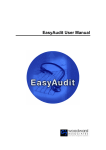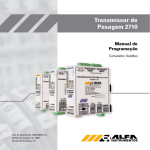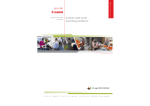Download Reference Cost Grouper User Survey 2007/08
Transcript
Report on the Casemix Service Online Survey for the HRG4 2007/08 Reference Cost Grouper Issue Date: November 2009 Table of Contents 1. Introduction ......................................................................................................... 2 2. The Survey.......................................................................................................... 3 3. Changes ........................................................................................................... 11 4. Findings ............................................................................................................ 13 5. The Way Ahead ................................................................................................ 13 6. Conclusion ........................................................................................................ 13 7. Acknowledgements........................................................................................... 13 1. Introduction The HRG4 Reference Cost Grouper software supports the NHS in England in grouping patient level activity data to Healthcare Resource Group [HRG] level. This report details the approach by which increased NHS end-user involvement in product specification was sought, and reveals how NHS-instigated Grouper amendments have been incorporated into the HRG4 2008/09 Reference Cost Grouper, released in January 2009 on the IC website (www.ic.nhs.uk/services/thecasemix-service/using-this-service/reference/downloads/costing). These changes seek to make the application better support the reference costs process. The Casemix Service is part of the NHS Information Centre. The primary role of the Casemix Service is to develop clinical grouping methodologies and software products that enable the NHS to determine groupings of clinical activity that reflect the care delivered to the patient. Healthcare Resource Groups [HRGs] are the current casemix currency used to describe primarily secondary care services and activity in the NHS in England. To translate patient information from local systems into HRGs, the NHS uses HRG4 Grouper software for the two distinct purposes shown below. 1) HRG4 Local Payment Grouper: the main roles of this grouper are: • • • Planning income reimbursement under Payment by Results [PbR] national policy; Calculating expected levels of income in-year based on current PbR national tariff. Managing local HRG4-based commissioning arrangements. 2) The HRG4 Reference Cost Grouper: this is used by the NHS to process their data at an FCE and spell level, in order to submit the annual national Reference Costs data collection to the Department of Health Payment by Results Operations team. HRG4 was used for the first time in submitting the 2006/07 Reference Costs data, in July 2007. As in previous years, an HRG Grouper was released to SenseCheck, RoadTest and calculate local payments for reimbursement via HRG4 for the 2009/10 financial year. Data from the Reference Costs traditionally helps to inform PbR national tariff calculations for future years. Thus the importance of the HRG4 Reference Cost Grouper to support the ability of the NHS in producing consistent and comparable Report on the Casemix Service Online Survey Author: The Casemix Service Copyright © 2009, The NHS Information Centre. All rights reserved. Page 2 Reference Costs data cannot be ignored. With this in mind it was decided that it was important to better understand the requirements of HRG4 grouper software end-users when grouping their patient level data to HRGs, to support the Reference Costs process. As part of this initiative, the Casemix Service ran an online survey during the autumn of 2008. This report discusses the findings of the online survey, and indicates the resultant amendments to the HRG4 2008/09 Reference Cost Grouper. The HRG4 2008/09 Reference Cost Grouper was released to the NHS on 31 January 2009, in readiness for use in the 2008/09 Reference Cost submissions. 2. The Survey The survey was approved by the Review of Central Returns Steering Committee – ROCR (reference number: ROCR/OR/0239). Approval was for a voluntary collection from Primary Care Trusts and NHS Acute Trusts, Foundation and NonFoundation. Monitor, Independent Regulator of Foundations Trusts, provided approval for a voluntary collection. 2.1 Approach The Casemix Service carried out a survey of users of the HRG4 Reference Cost Grouper between 24 October and 7 November 2008. The aim of the survey was to ask users their views on the performance of the existing software (the 2007/08 HRG4 Reference Cost grouper) and for suggestions as to how future versions could be improved. The survey was carried out using an online survey tool and was designed to take only a few minutes to complete to maximise responses from a busy user community. The survey consisted of eighteen questions divided into the following sections: 1. 2. 3. 4. 5. 6. 7. About You Delivery and Features Outputs and Enhancements Delivery and Enhancements Outputs and Documentation Outputs and Technical Further Comments A link to the survey was placed on the Casemix website (http://www.ic.nhs.uk/casemix) and e-mail notification was sent to all individuals that had registered on the website for regular electronic updates during the design and delivery of HRG4 (www.ic.nhs.uk/services/the-casemix-service/gettinginvolved/register-for-updates). Report on the Casemix Service Online Survey Author: The Casemix Service Copyright © 2009, The NHS Information Centre. All rights reserved. Page 3 2.2 Survey Questions and Responses The numbered paragraphs below summarise the general points gleaned from the survey results. In each case, the summary is accompanied by either a tabulation of the responses or a graphical representation of the response counts based on screenshots from the online survey system. Some percentages tabulated below do not total exactly 100%; this is due to rounding in the displayed figures. 2.2.1 Section One: About You Question 1: What type of organisation do you work for? As expected, the majority of survey respondents came from NHS hospital trusts, however there was also a useful set of responses received from people working in other NHS organisations, as well as from organisations outside the NHS. 1. What type of organisation do you work for? NHS Hospital Trust 81.0% NHS Mental Health Trust 1.3% NHS Primary Care Trust 10.5% Private Consultancy 2.0% Device Company 0.7% Voluntary Sector - SLA with NHS contract 0.7% Other (please specify) 3.9% Question 2: In which of the following areas do you work? The majority of responses were from people working in finance or information roles, although a number were received from people employed in other areas such as, performance, commissioning, coding and clinical areas. 2. In which of the following areas do you work? Information 34.6% Report on the Casemix Service Online Survey Author: The Casemix Service Copyright © 2009, The NHS Information Centre. All rights reserved. Page 4 Finance 37.3% Performance 2.6% Commissioning 5.9% Clinical 3.3% Clinical Coding 6.5% IT Development 2.0% Research 0.7% Software Development 2.0% Other (please specify) 5.2% Question 3: Approximately how many records of the following datasets did your organisation group for the 2007/08 Reference Costs collection? If you did not complete a Reference Cost Submission, how many records of these types would you expect to group? Please enter numbers only, without commas or full stops. The responses showed a maximum for Admitted Patient Care of 450,000 records and for Non-Admitted Care a maximum of two million records. As the grouper has been tested with 15 million records, there is no capacity issue for users. 2.2.2 Section Two: Delivery and Features Question 1: How would you rate the following aspects of the design and delivery of the HRG4 Reference Cost Grouper? The table below shows the areas covered. The majority of respondents who expressed a view thought that ‘look and feel’ and ‘performance’ of the HRG4 Reference Cost Grouper were above average. The balance of opinion for ‘usability’ was that a very small majority considered it to be average or worse. A significant percentage of respondents thought that ‘look and feel’, ‘usability’ and ‘performance’ of the software were good or excellent. Less than 6% of respondents rated any of the areas questioned as Very Poor. Report on the Casemix Service Online Survey Author: The Casemix Service Copyright © 2009, The NHS Information Centre. All rights reserved. Page 5 Support from The Casemix Service was rated as Good or Excellent by almost half of respondents, with almost 40% having no View on this issue. 75% of respondents rated the Timing of Release of the grouper as Average or better. This represents a large improvement over the results of the previous year’s survey where the significant majority considered this to be Poor or Very Poor (reduced to 10% of respondents in the new survey). This improvement correlates with a much earlier release date than that of the grouper surveyed in the previous year. 4. How would you rate the following aspects of the design and delivery of the HRG4 Reference Cost Grouper? Excellent Good Average Poor Very Poor No View Timing of release 4.0% 32.7% 37.6% 5.9% 4.0% 15.8% Look and feel 4.0% 40.6% 28.7% 5.9% 1.0% 19.8% Usability 5.0% 36.6% 31.7% 5.9% 3.0% 17.8% Performance 3.0% 44.6% 28.7% 4.0% 1.0% 18.8% Support from The Casemix Service 2.0% 26.7% 18.8% 6.9% 5.9% 39.6% Question 2: How would you rate the quality of the following features of the HRG4 Reference Cost Grouper? The table below shows the areas covered. Report generation and documentation/help were considered ‘Poor’ or ‘Very Poor’ by a relatively high proportion of respondents (10-15%), and this is an area we shall be investigating in future surveys. 2. How would you rate the quality of the following features of the HRG4 Reference Cost Grouper? Report on the Casemix Service Online Survey Author: The Casemix Service Copyright © 2009, The NHS Information Centre. All rights reserved. Page 6 Excellent Good Average Poor Very Poor No View Sample Record Definition Files 3.0% 44.6% 21.8% 1.0% 1.0% 28.7% Record Definition File Wizard 5.9% 29.7% 23.8% 3.0% 1.0% 36.6% Grouping a File 5.0% 46.5% 21.8% 4.0% 1.0% 21.8% Single Spell Grouper 4.0% 34.7% 26.7% 3.0% 1.0% 30.7% Displaying Files 3.0% 32.7% 28.7% 4.0% 2.0% 29.7% Generating Reports 0.0% 36.6% 23.8% 8.9% 2.0% 28.7% Tabbed Display of Files 2.0% 29.7% 28.7% 3.0% 1.0% 35.6% Documentation/Help 0.0% 22.8% 33.7% 10.9% 5.9% 26.7% Log Window 3.0% 27.7% 31.7% 2.0% 1.0% 34.7% 2.2.3 Section Three: Outputs and Enhancements Question 1: How would you rate the quality of the following outputs of the HRG4 Reference Cost Grouper? The table below shows the areas covered. The ‘Flat’ output received the best rating with almost half of respondents rating this as ‘Excellent’ or ‘Good’. The relational outputs were considered less favourably with a minority (36.97%) considering these to be ‘Excellent’ or ‘Good’. Report on the Casemix Service Online Survey Author: The Casemix Service Copyright © 2009, The NHS Information Centre. All rights reserved. Page 7 1. How would you rate the quality of the following outputs of the HRG4 Reference Cost Grouper? Excellent Good Average Poor Very Poor No View ‘Flat’ Output (all data in one file) 5.3% 44.2% 29.5% 2.1% 1.1% 17.9% ‘Relational’ Output (e.g. unbundled HRGs in a separate file) 5.3% 31.6% 23.2% 8.4% 5.3% 26.3% Quality Outputs 4.2% 34.7% 32.6% 4.2% 1.1% 23.2% Episode Reports 3.2% 32.6% 23.2% 5.3% 1.1% 34.7% Spell Reports 3.2% 29.5% 21.1% 5.3% 2.1% 38.9% Question 2: Are there any other features that you would find useful in future releases of HRG4 Reference Cost Groupers? A list of responses to this question is given in Appendix A. 2.2.4 Section Four: Delivery and Enhancements Question 1: What did we do well in the design, delivery and support of the 2007/08 HRG4 Reference Cost Grouper? A list of responses to this question is given in Appendix B. Question 2: What could we have done better in the design, delivery and support of the 2007/08 HRG4 Reference Cost Grouper? A list of responses to this question is given in Appendix C Report on the Casemix Service Online Survey Author: The Casemix Service Copyright © 2009, The NHS Information Centre. All rights reserved. Page 8 Question 3: Are there specific interface features that you feel could be enhanced? 75% of respondents answered ‘No’, indicating that most users felt the user interface was adequate for the intended purpose. However, a quarter of respondents did feel that specific interface features could be enhanced, with suggestions including: • improvements to the Record Definition File creation features. • integration with Microsoft Office applications. • improvements to the documentation with respect to the command-line interface. A list of responses to this question is listed in Appendix D. 2.2.5 Section Five: Outputs and Documentation The majority of responses to the questions in this section indicated that users felt these areas were acceptable but some users felt that improvements could be made. Question 1: Are there aspects of the output files that you feel could be improved? Just over a fifth of respondents felt that there were aspects of the output files that could be improved. Several answers indicated that users had experienced issues when loading the data into relational database management systems; the varying number of unbundled HRG fields was cited as a problem by some users. A list of responses to this question is listed in Appendix E. Report on the Casemix Service Online Survey Author: The Casemix Service Copyright © 2009, The NHS Information Centre. All rights reserved. Page 9 Question 2: Are there sections in the documentation that you believe could be improved? 63.3% of users answered ‘No’ to this question. However, almost 40% of users believed that improvements were possible; common themes that were raised included: • Record Definition File creation • HRGs derivation • Clarity of examples • Input and output file specification • Command line usage • Navigation within documentation. A list of responses to this question is given in Appendix F. Question 3: Were there areas of data preparation that caused difficulties? 72.2% of respondents answered ‘No’ to this question. Areas in which users had experienced difficulties with data preparation included the manipulation of fields into the appropriate format e.g. leading zeroes required in some fields and removal/insertion of decimal points. See Appendix G for a list of responses to this question. 2.2.6 Section Six: Outputs and Technical Question 1: Did you find that the new ‘relational’ outputs (e.g. unbundled HRGs in a separate file) made importing the processed data to a relational database more straightforward? Report on the Casemix Service Online Survey Author: The Casemix Service Copyright © 2009, The NHS Information Centre. All rights reserved. Page 10 Over 40% answered ‘Not applicable’ to this question. One explanation of this could be that those users had not used this particular feature; this requires further investigation. Of those that answered Yes or No, more than half indicated that they found the new relational outputs made importing to a relational database more straightforward. Question 2: What is your computer operating system (e.g. Windows XP, Windows Vista)? The overwhelming majority of user operating systems was Windows XP. Question 3: Did you experience installation problems? If so, what were they? 52 responses were received, of these, 44 said there were no problems. Of the remaining eight only three reported significant installation issues; others were noncommittal. Question 4: Did you experience any difficulties in running the grouper? If so, please explain the difficulties and how they were resolved. 47 responses were received, 34 said categorically that there were no difficulties. Of the remaining 13, only two reported actual difficulties. 2.2.7 Section Seven: Further Comments There was only one question in this section (“Are there any further comments you would like to make?”); a list of responses is given in Appendix H. No common themes emerged from the responses given. 3. Changes The changes listed below were made to the reference cost grouper prior to the release of the HRG4 2008/09 Reference Cost grouper. General • Improvements to documentation. • Adult Critical Care: o Two input fields were added: CC Start Date, and CC Discharge Date (both have the format CCYYMMDD). o two output fields were added Calc CC days (integer), Warning Flag (char(1)); these provide validation of the two new input fields. Report on the Casemix Service Online Survey Author: The Casemix Service Copyright © 2009, The NHS Information Centre. All rights reserved. Page 11 o Validation of the support days (ARSD, BRSD, CCL2 etc) fields was made more strict, leading zeros now produce an error. • • • • • • • • • • • • • • • Admitted Patient Care, two new input fields, Rehabilitation Days and Specialist Palliative Care days, were added. The episode duration used in grouping is now calculated as Input Epidur minus CC day minus Rehab days minus SPC days with an overall minimum of zero. Support for fixed-width input files was removed. The grouper can now only accept comma-delimited text file input. Each grouper type (Reference Costs, Local Payment, Road-Test) now has a distinctive lozenge to help reduce the likelihood that a user processes data with the wrong grouper. Validation was added to ensure that Epiorder is unique within Spell. ICD-10 dagger/asterisk processing was enhanced. The number of diagnoses and procedures accepted by the grouper was increased from 14 and 12 respectively to a user-defined maximum of 99 in both cases. This is defined in the record definition file. Spell level Cross Validation of Discharge Destination and Discharge Method was removed. Output file structure was modified; fields were added and file names were updated. The user manual was updated to describe the output files in detail. The installation of multiple instances of the grouper was facilitated. The uninstall icon was removed from the grouper start menu group in order to reduce the chance of accidentally uninstalling the grouper. Changes were made to the processing within the grouper to allow greater consistency in the grouping databases. The maximum allowed number of episodes in a spell was increased from 70 to 87, in line with the NHS Data Dictionary. The checkbox 'Input data has headings' is now checked by default on installation. Neonatal Critical Care and Paediatric Critical Care grouping were introduced. Various minor bug fixes were made to processing algorithms and input data validation. Additional Reports Six new reports were added to support additional Reference Costs requirements. These are: • Non-Elective Short-Stay • Non-Elective Short-Stay Emergency • Non-Elective Short-Stay Non-Emergency • Truncated Non-Elective Long-Stay • Truncated Non-Elective Long-Stay Emergency • Truncated Non-Elective Long-Stay Non-Emergency Report on the Casemix Service Online Survey Author: The Casemix Service Copyright © 2009, The NHS Information Centre. All rights reserved. Page 12 4. Findings 4.1 Positive Themes from the Survey Where users were asked to respond on the scale ‘Excellent’-‘Good’-‘Average’‘Poor’-‘Very Poor’, for 13 out of 19 questions more than half the responses were either ‘Excellent’ or ‘Good’. For the remaining six questions, more than half the responses were at least ‘Average’. These positive messages covered the areas ‘Delivery and Features’ and ‘Outputs and Enhancements’. The great majority of respondents gave positive feedback regarding the interface, output files, documentation and data preparation. 4.2 Key Areas for Improvement from the Survey Three themes emerged from the survey: Documentation/Help: this was categorised as either ‘Poor’ or ‘Very Poor’ by over 16% of users which indicates that there are a number of improvements to be made in this area. Data preparation issues: providing input data in the required format presented difficulties for some users. Support from The Casemix Service was rated as either ‘Poor’ or ‘Very Poor’ by more than one in ten respondents. This needs to be fully understood and addressed if the Casemix goal of meeting NHS expectations is to be attained. 5. The Way Ahead As described in section three above, several changes were implemented in the HRG4 2008/09 Reference Cost grouper. Whilst the above improve Reference Costs compliance and usability of the Grouper software, and ensure that the outputs (including reports) are more relevant and appropriate, there are other areas, particularly documentation, data preparation and support which will need further continued effort on the part of The Casemix Service to fulfil NHS expectations and requirements. The next survey will include questions that explore the key issues raised in this survey in greater depth. 6. Conclusion The online survey has again proven to be valuable and forms a valuable part of the annual cycle of stakeholder engagement events; the aim being to continually improve HRG4. 7. Acknowledgements The Casemix Service would like to thank all participants in the online survey; your time and input are greatly appreciated. Report on the Casemix Service Online Survey Author: The Casemix Service Copyright © 2009, The NHS Information Centre. All rights reserved. Page 13 Appendix A There were 20 responses to the question “Are there any other features that you would find useful in future releases of HRG4 Reference Cost Groupers?” A selection is listed below. • It would be helpful if the grouper could produce reports for short and long stay as this is a requirement of reference costs. • Increased number of available reports would be useful. The current Grouper did not supply sufficient reports for the needs of our Finance Department to complete reference costs. • Hard copy of diagnosis and procedure codes to HRG files • An indication as to how FCE HRGs, Spell HRGs and Unbundled HRGs will be reported when there are tens of HRGs per Spell e.g. Rehabilitation will have 1 HRG per day which will potentially produce hundreds of HRGs. • I think a hierarchy cross reference would be extremely useful • As our outpatient and inpatient files were over the 60,000 ish excel limit the 'flat' output reports had to be imported in to access and divided in to smaller files for finance to use. Not sure if there is a way around this? • Previous versions allowed you to enter a single procedure or a single diagnosis code in the tables menu to see which HRGs the single code could group to. This was helpful when you given a procedure code but no diagnosis code. • Ability to alter reporting to include / exclude other items • I would suggest that the user interface needs to be completely redesigned! It is not intuitive, and I've used HRG groupers for years and I still struggle when I come to use it again. • Yes being able to write out all of the lookup tables as you use to be able to in HRGv3.5. There is a problem that the IC has documented the lookups in a PDF file but have not provided all of this information in flat files to be used outside of the grouper. The code to group table misses vital CC tables which you can't easily pull out of the PDF file. • We need to run the HRG4 grouper on a server with 64bit architecture and currently we cannot get it to work as we assume it is 32bit. Changing the compatibility on the server doesn't help. This would be quite a tricky improvement but if you can do it, it would be useful. • Ability to create reports rather that just use standard ones • A well defined API that can be called programmatically so that I can integrate the assignment of HRG codes into other procedures, especially for "What if" queries. Even better would be a web service accessible over the NHS Net. • A dedicated spell extract would be useful rather than at episode level. Also for all reports to meet reference costs needs - I found I was doing additional data extracts manually as reports weren't good enough • Some functionality where Local Codes don't need to be removed. An input table of codes that can be ignored to enable this would be useful, then the grouper could possibly identify and skip to looking at next codes in the sequence Report on the Casemix Service Online Survey Author: The Casemix Service Copyright © 2009, The NHS Information Centre. All rights reserved. Page 14 • To make sure that all episodes have the +1 day added to the EPIDUR in the ReportEPIDUR as this caused lots of problems with the transfer to Ref Costs. Also in a similar vein, the ReportEPIDUR field should be numeric so that it can be used for calculations. • The relational output, in particular the unbundled HRGs, would be far far better if it was incorporated into the main flat file along with the HRGs. The multiple xml output files make incorporating the information into the flat file data is excessively difficult for a one-off reference costing, and a total nightmare to set up for routine reporting. Report on the Casemix Service Online Survey Author: The Casemix Service Copyright © 2009, The NHS Information Centre. All rights reserved. Page 15 Appendix B There were 34 responses to the question “What did we do well in the design, delivery and support of the 2007/08 HRG4 Reference Cost Grouper?”. A selection is listed below. • As the grouper follows the principles of previous groupers, this is helpful in the utilisation of this software. • Biggest improvements are: record definition file setup and incorporation of spell converter into grouper • Ease of use. • The Grouper follows the principles of previous Groupers which is helpful in the utility of a new tool. • Clear and concise roadshows • The fact that it was similar to the 2006 / 07 version helped, because of the familiarity. I find the HRG4 Code to Group Design spreadsheet very useful. • The look and feel of the Grouper is very 'User Friendly'. Navigation around the Grouper is quick and simple. • It supports most of the summarising needed for reference cost submission • Early briefs. • It was easy to use. The output files in xml were easy to drag into Excel, although this wasn't apparent at first. • The support to the product was better than the product itself • Timing was good • All FCE's now remain, old grouper deleted those not dominant. Better for audit trails • support was good • released it on time • I don’t feel that the product has hugely changed in the last few years. It is fairly easy to use • Simple design and similar to previous groupers so the learning curve is not steep • The roadshows content but the administration was confusing. In general the support was received was excellent • Fairly easy to use • Consistent look and feel and easy to find your way around. The ability to generate reports from the command line. • Having a grouper and spell converter in one file. Report on the Casemix Service Online Survey Author: The Casemix Service Copyright © 2009, The NHS Information Centre. All rights reserved. Page 16 • design: easy to follow using definition file. • It is at least bigger than the 3.5 spells grouper! • I think more support to information staff with launch training days would be useful. • Issued well within timescales, no issues with design to worry about. No problems with support as FAQ pages answered all questions • Early delivery, seemed error free. • combining spell converter and grouper • Far better than the v3.5, more coherent • Brought out grouper in time for proper testing before the main rush for Ref Costs. Report on the Casemix Service Online Survey Author: The Casemix Service Copyright © 2009, The NHS Information Centre. All rights reserved. Page 17 Appendix C There were 34 responses to the question “What could we have done better in the design, delivery and support of the 2007/08 HRG4 Reference Cost Grouper?”. These included: • Further support with regards to short and long stay patients would be helpful. • Nice to have a quick way of seeing HRG construction from within product. Currently have to open huge spreadsheet and filter, resize and print or print PDF. • Delivery of software well in advance would be welcomed rather than just before organisations have to submit returns • Guidance wasn't always clear, especially for Critical Care part. • Improved Helpdesk response. • The Grouper documentation was not particularly helpful. More explicit help files would be useful. • Remove incidents where there are erroneous HRG Codes • It could have been available earlier. • A better user guide. • Better definitions of unbundled elements, such as radiotherapy planning. • No one on the phone to help me with a query • Validation of coding was not always correct and valid codes failed to group • Formal training on how to use the software and more especially the design concepts and logic of v4 would be helpful for people new to HRGs. The IC used to run courses and had a training CD-ROM but don't appear to anymore, although I maybe mistaken • I couldn't get the single spell grouper to work with the inpat record definition file. • Deliver it much, much earlier to allow testing and the setting up of files to support/input into the grouper • The software's UI is badly designed; it's confusing as to which rdf file is selected etc. • reporting element of it • Earlier release. More flexibility so that it interfaces better with other software • More detailed documentation about running from batch files and things like that as we normally run the grouper in packages automatically on the server rather than going in through the interface itself. • It would be better to have the grouper earlier. • The instruction file on how to install the software was packages within the distributable file and could not be accessed until you had installed the software. Shadows of the Circumlocution office there. Report on the Casemix Service Online Survey Author: The Casemix Service Copyright © 2009, The NHS Information Centre. All rights reserved. Page 18 • Given the fact that a lot of Trusts have not implemented a lot of the DSCNs and have differing ways of recording data, the Grouper needs to be more flexible. Simply not grouping an episode because a specialty code appears to be wrong shouldn’t matter. A trust will still be expected to be paid for U codes that should be normal HRGs. • Clearer documentation on allowed parameters of some of the new fields like critical care and neonatal level of care code. how this is expected to be filled and implications of leaving these blank on the eventual HRG code • Support from casemix team very poor. Having to do everything by email and not being able to talk to someone who understood the problem very frustrating. • The whole interface is counter-intuitive. It starts all wrong with the File Menu - I would expect to be nominating my input, not the RDF. I would expect the RDF to be under another menu, probably Options. Being an on-line process invites error - input or output of the wrong file, particularly - hence my next grumble! • The grouper didn't support reference costs for all reports so a link between the reference costs manual Finance uses and the reports produced by grouper needs to be done so we know which reports feeds which part of the return. There were gaps that we had to get round with manual reports we had to design out of the grouper • It could be faster • Sometimes the data validation didn't fully explain the issue • It would be helpful if the errors messages were more specific - can be very difficult to track down what the problem is Report on the Casemix Service Online Survey Author: The Casemix Service Copyright © 2009, The NHS Information Centre. All rights reserved. Page 19 Appendix D There were 23 responses to the question “Are there specific interface features that you feel could be improved?”. These included: • improved documentation and functionality relating to the command line interface in order to help with automating use of the grouper would be beneficial, as would more attention being paid to making output files uniform to enable easily loading into a database - we don't all use excel! • Record definition file designer • Critical Care guidance. • RDF Designer. • The use of tabs is confusing. Selecting rdf and database. Overall look and feel of the software looks cheap. • Perhaps need to work closer with the ref cost group to ensure that grouper can deliver what the ref cost is asking for. For example consultant led or non consultant led can only be defined from clinic codes so the grouper doesn't pick this info up. Perhaps the grouper can be changed to allow trust to put in local codes so that the grouper can report the required information. Also critical care only delivers the critical care periods and not the bed days . Again it does not conform to what is required for Reference Costs. • Separate grouper from spell converter • I think it could be made more user friendly for the non IT staff • The whole thing needs an overhaul. Functionally it does what it says on the tin, but the UI isn't well designed. • User interface • Being able to write out the look ups as specified above. • Link into access better • The command line interface could do with more options and better documentation. I use this to automate the extraction and processing of data for users. • The grouping • This applies to all Groupers - I would like to run groupers via a Windows vbscript / batch file. There is some documentation about this, but it is short on windows relevant info - and I would appreciate some windows examples with file paths, in particular where the file path contains blanks. "Typing Hrggrouper /?" where? - will not work via the Windows Run dialog without the path • Separate spell file as in v3.5 and PBR specialty for devolving the income • Don't know enough about it to answer your survey well • It was a while ago now but i seem to recall that you couldn’t save a partially finished rdf? • Detail of error messaging. Report on the Casemix Service Online Survey Author: The Casemix Service Copyright © 2009, The NHS Information Centre. All rights reserved. Page 20 Appendix E There were 20 responses to the question “Are there aspects of the output files that you feel could be improved?”. These are listed below. • It would be helpful if the output files incorporated ways of identifying long and short stay patients. • The structure of the output files needs to be consistent (i.e. number of columns) to allow loading into a database • Knowing beforehand how many unbundled fields there are likely to be so that it can be loaded into a database where the load table has to be defined beforehand (can't handle variable numbers of fields) and not putting blank space between output fields when this can't happen with input fields • Name outputs e.g. unbundled, spells, etc rather than 001, 002 rather than having to refer to documentation to determine what report you are looking at. • With NAC making it clearer what the different reports show, or how the data was split. • Missing headings for unbundled make importing into access not straight forward • Unbundled elements • Not sure, I didn't use the grouper, just the output. • Include field headings for all unbundled data • Can one export / report from grouper contain errors, unbundled and all activity rather than "merging" separate files outside grouper • Output files were used by finance department, so no opinion • The export files do not have the same number of columns on each row. It varies according to how many unbundled HRGs there are on the end and this makes importing into our SQL database very difficult. We have to open the export files in Excel and convert them to xls files for easy import. Not very helpful for automated processing! • It would be better if the unbundled HRGs each had their own column title. • Output to include column headers • Spell specialty needs to be added • Don't know enough about it to answer your survey well • Unbundled HRGs need to be incorporated into the flat output file Report on the Casemix Service Online Survey Author: The Casemix Service Copyright © 2009, The NHS Information Centre. All rights reserved. Page 21 Appendix F There were 33 responses to the question: “Are there sections in the documentation that you believe could be improved?” These included:• Codes to grouper tables aren't very useful in current format. Documentation for grouper itself was OK • Sections around the specification of the input and output files could be clearer • Answered no but don't know because I didn't use it much. • Report definitions. Guidance for critical care. • Better RDF samples and technical documentation. • Support documentation with regards to obtaining the necessary information for Finance to produce reference costs. • It's not easy to follow how HRGs are assigned. Look up tables or hard copy files would be useful if huge! • Need documentation of all fields in one place And what TRIMPOINT of 32000 means? Non-PbR, I'm assuming • Using the rdf wizard, no documentation available for the different fields' meaning • When I came across problems I did struggle to find the relevant documentation easily on the website. • A step by step guide to usage. • Unbundled elements • Clearer instructions how to build RDF file • Not sure, I didn't use the grouper, just the output. • How to extract the data tables used in grouper i.e. the investigation codes • A full example from generating Episode data in the correct format, through to creating an rdf and grouping the file etc should be given. • I constantly struggle with doing a single spell and the documentation is not much help • The use of the grouper from batch files. More detailed explanation of the flags that can be used from the command line and what they do. • Some of the procedures could be more clear • Some documentation of what data would be accepted would have been useful as the Critical Care wouldn't accept a valid Data Dictionary code for the Unit Function • Command line commands and examples could be better. Better detailing on how to create and modify RDF files, as well as what each item means and how it is used. There is a lot of attention on how to Report on the Casemix Service Online Survey Author: The Casemix Service Copyright © 2009, The NHS Information Centre. All rights reserved. Page 22 extract data but not that much on the format or list of required fields. • A table that shows the required fields and there formats. Also, the exclusions list that shows what will be rejected and what won’t for each field. • More concise details on what data allowed values are • With ALL groupers, the help could provide an exact definition of each input & output field and any calculations involved, with examples • There needs to be a link to reference costs reporting requirements so we can easily see what reports feeds which section. There were gaps. • Clearer indexing/explanations – I personally found it hard to locate the information on setting up and creating my RDF. The tool is very useful but it was trial and error that i got it to work. • Don't know enough about it to answer your survey well • Well, its better than it was before but still needs work • error reporting • Not enough detail on required filed / file format - APC is ok but A&E is hopeless Report on the Casemix Service Online Survey Author: The Casemix Service Copyright © 2009, The NHS Information Centre. All rights reserved. Page 23 Appendix G There were 24 responses to the question “Were there areas of data preparation that caused difficulties?”. Several are listed below. • This was with regards to short and long stay patients. This had to be set up locally as this information was not produced by the grouper. • APC Critical Care exclusions not clear. • Because we record Source of Admission and Method of Admission and Discharge types per episode and not the same values throughout the Spell, it made it tricky to amend the values to be valid for the Grouper to read. • Number formats (as text, as number, leading zeroes) specially for the CCMDS data preparation. Unit functions and organs supported require different formats • Changes to Trimpoints advised late. • Formats • Unbundled elements • Formatting numbers & letters correctly to correct decimal points • Not sure, I didn't use the grouper, just the output. • Mainly with the format of our data fields and finance wanting extra data included in the data. Just internal data problems! • The admitted patient file asked for age as start of episode, but then failed to group if the age at the start of every episode in the spell was not the same, because the patient had a birthday while in hospital. I had a problem attaching the critical care bed days to the episode data • Acceptance of data from Access derived csv files was sometimes declined, even though 'values' same when using Excel to convert files • A+E particularly difficult in data prep. • Except that it is very picky about data formats which will make it very difficult to be used on commissioning datasets with substantial data cleaning by PCT staff. That will defeat the objective of developing clean data but it will be the only way it will work. • Local Codes, Matching Discharge details from final episode to previous episodes within the same spell although this is more of a Trust Information issue I feel. Although if the grouper were able to look back on itself to match the Details from the last episode to the previous ones this could be useful • Not within HRG4 grouper • Setting up files to comply with grouper needs Report on the Casemix Service Online Survey Author: The Casemix Service Copyright © 2009, The NHS Information Centre. All rights reserved. Page 24 • Additional fields were required and there were problems obtaining some of them - specifically consultant main specialty and critical care days • Numerical fields having text, but the main issue was that the error reporting didn't really explain this, so many man-hours were wasted on the back of not knowing what the issue was. Report on the Casemix Service Online Survey Author: The Casemix Service Copyright © 2009, The NHS Information Centre. All rights reserved. Page 25 Appendix H There were 22 responses to the question in section seven “Are there any further comments you would like to make?”. These include:• None • I am an end user. Our Information Services are the actual users of the Grouper and they send the Grouped info to me in a Pivot Table for use in Reference Costs. Similarly on previous versions of the grouper used for PbR, Information Services have Grouped all the activity before it is sent to Finance • It would be helpful if the DH / IC roadshows could be arranged to take place as close as possible to the release of the 2008 / 09 HRG4 Grouper software, to maximise the benefits of user understanding. • With the exception of the J40X issue, I found the Grouper to be robust and reliable. The Quality reports are invaluable. Praise indeed from me for producing a very good product. To be able to 'Dump' the files out of the Grouper as possible in HRG version 3.5 would be useful. • 1) When's the Road Test Grouper going to be available? 2) Still not sure how to cost PbR episodes in a Non-PbR spell and vice-versa • Product is still ahead of the knowledge and experience to use it. • Bring it out earlier in the year! ie January 09 for the 0809 collection • Can you make the software web-based so that we don't need to try and keep up-to-date with which version we need to use for which purpose, e.g. Reference Costs, PBR etc? • Early release and consistency are key • I just ran the grouper for finance, therefore no opinion on output files • Difficult to comment on most of these questions as I work in finance and don't actual run the grouper. I take its output and produce reference costs. • We do not currently qualify for payment in this way; therefore, I am unable to make any useful comment on the system. • It would be very nice if the grouper had a COM/COM+ interface or even a .NET Assembly that could be accesses. If the client side app was a consumer of a web service hosted by either the Information Centre or Casemix then if any changes needed to be made to the algorithm to correct errors you would only need to change it in one place and everyone would immediately benefit from the greater accuracy. This improves maintainability and ease of deploying upgrades. It also means that trusts who do not regularly check for updates are not left behind. • Overall a good product but the documentation to some of the fields could be more detailed. 8/10 Report on the Casemix Service Online Survey Author: The Casemix Service Copyright © 2009, The NHS Information Centre. All rights reserved. Page 26 • I think SHA level training days would have been beneficial, especially as it is a great change from v3.5 to 4.Analysts in Trusts were calling one another to get over issues that were cropping up in rdf files. Also the error in the grouping for J40 was not emailed out as soon as it was known. That would have saved some wasting of time at our end trying to solve an issue that was within the grouper and not a data problem. • Don't know enough about it to answer your survey well • Will this grouper be used in the future to replace the hrg v3.5 grouper and spell converter? if so, what will happen with excluded episodes? Also, more diagnosis and procedure codes should be used in the calculations as we have up to 25 of each when coding takes place, some unbundled HRGs are missed • Thanks and please continue to improve. Report on the Casemix Service Online Survey Author: The Casemix Service Copyright © 2009, The NHS Information Centre. All rights reserved. Page 27




























